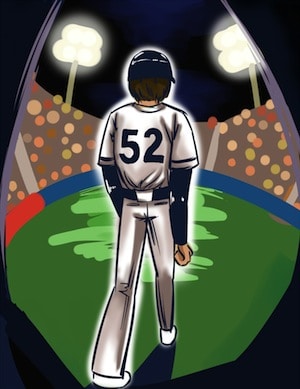The upcoming holidays will provide a break from school stresses after the exam period. But the holidays are not rooted in breaks from the modern work schedule; the holidays are rooted in the Biblical calendar, so it is to religion that we owe our thanks for this holiday break.

NANCY JI/THE VARSITY
For those who are religious, their religion’s calendar affects their lives around certain times of the year, such as ongoing Chanukah and upcoming Christmas.
Regardless of individuals’ present religious practices, prominent religious holidays’ names will be familiar. Similarly, it would be difficult to find someone who is unfamiliar with the World Series, the Stanley Cup, the Superbowl, and Wimbledon.
“There are certain markers in religion that are those special moments in time and are more sacred than the rest of the calendar,” said Peter Schwartz, co-author of Baseball as a Road to God: Seeing Beyond the Game.
Like followers of religion, these events seep into the lives of fans of the sports; fans will organize their schedules around the events, dress in accordance with the games, and discuss and predict upcoming results daily. If the significant games take place during the day, an increase in “sick” workers can also be found.
“In both religion and in sport there are moments of heightened awareness and heightened sensitivity that matter more to the observer and those interpreting it than other more profane moments along the way,” said Schwartz.
As the calendar and games progress to the end of the season, intensity levels rise, and regular-season games seem to hold more importance. Similarly, the time leading up to religious holidays slowly begin to hold more significance. Leading up to Easter, one of the most significant days in the Christian calendar, Christians go to church for Palm Sunday, Good Friday, and Holy Saturday.
Similarly, during the baseball season, few feel the intensity of a mid-June day game between the Padres and the Giants, but as the season progresses, each game becomes a little more important, leading to the first round of division series of the playoffs, the championship series, and, finally, the World Series.
“The tension grows to a crescendo at those moments,” said Schwartz.
“Baseball mirrors this in a way, where it’s a close game during the dog days of summer doesn’t hold the same resonance as a 1-run game in October because so much more is on the line, and it’s not simply a matter of winning and losing, it’s a matter of feelings evoked in the players, and especially in the fans, while watching this,” he added.
Finally, along with the scheduled events, abnormalities will sometimes occur in a game that are so rare and unexpected that they cause an ineffable sensation. The players’ names and the games’ dates will go down in the sport’s history forever. A perfect game may never occur again in baseball, and a record may never be broken; when these rarities do occur, however, feelings and emotions are provoked, similar to those evoked by religious miracles.
The significance between these rarities in sports and religion are significant not simply because of their rarity, but because of the idea of the unexpected and the inexplicable being realized.
On May 7, 2011, I saw Tigers ace pitcher Justin Verlander throw a no-hitter against the Blue Jays. I had never seen a no-hitter in person before, and probably never will again. Despite the game occurring at Verlander’s opposing team’s stadium, the crowd was swept with an ineffable sensation and congratulated the pitcher on his feat. The next day, Verlander signed my ticket from his no-hitter, and I kept this memento in my wallet as a reminder of this miraculous feat that I witnessed.
That November, my wallet was stolen. I didn’t care about the money that was lost, the cards that would need to be replaced, or the wallet itself, which was a black leather Marc Jacobs. What I was most upset about was the idea that this unique piece of memorabilia from a miraculous event would now and forever be rotting in the sewers of Toronto.
Baseball has affected me in a way in which nothing else has been able to up to this point in my life, just as religion has done for millions of people around the world, and I owe many thanks to it.

